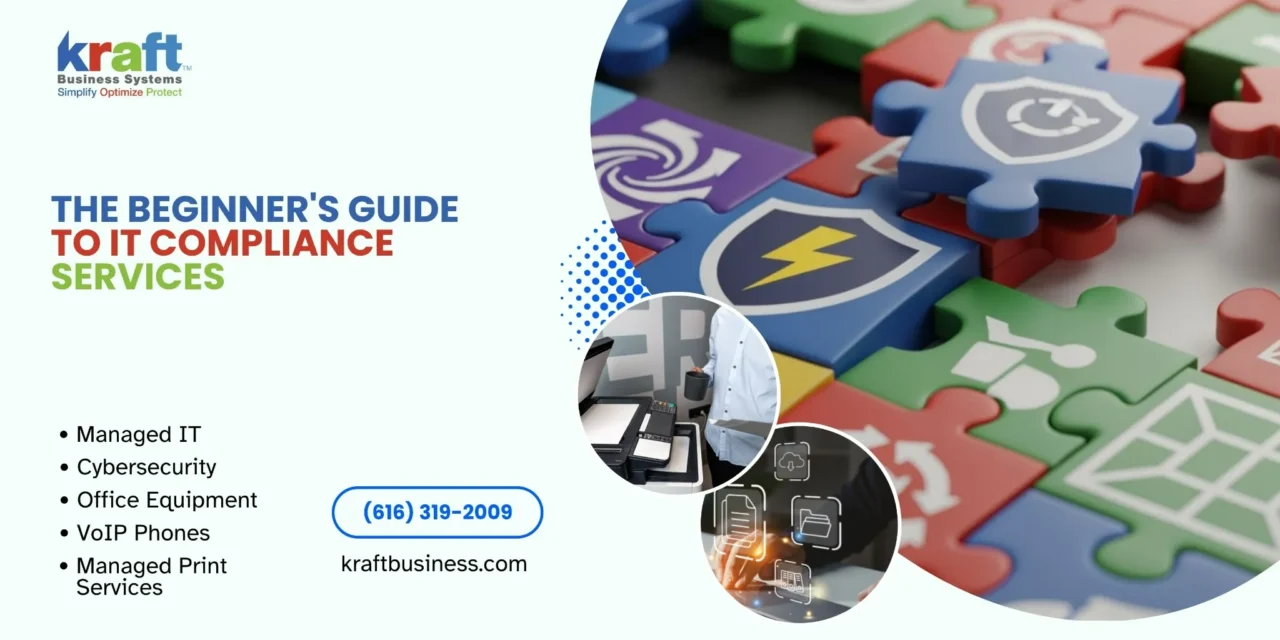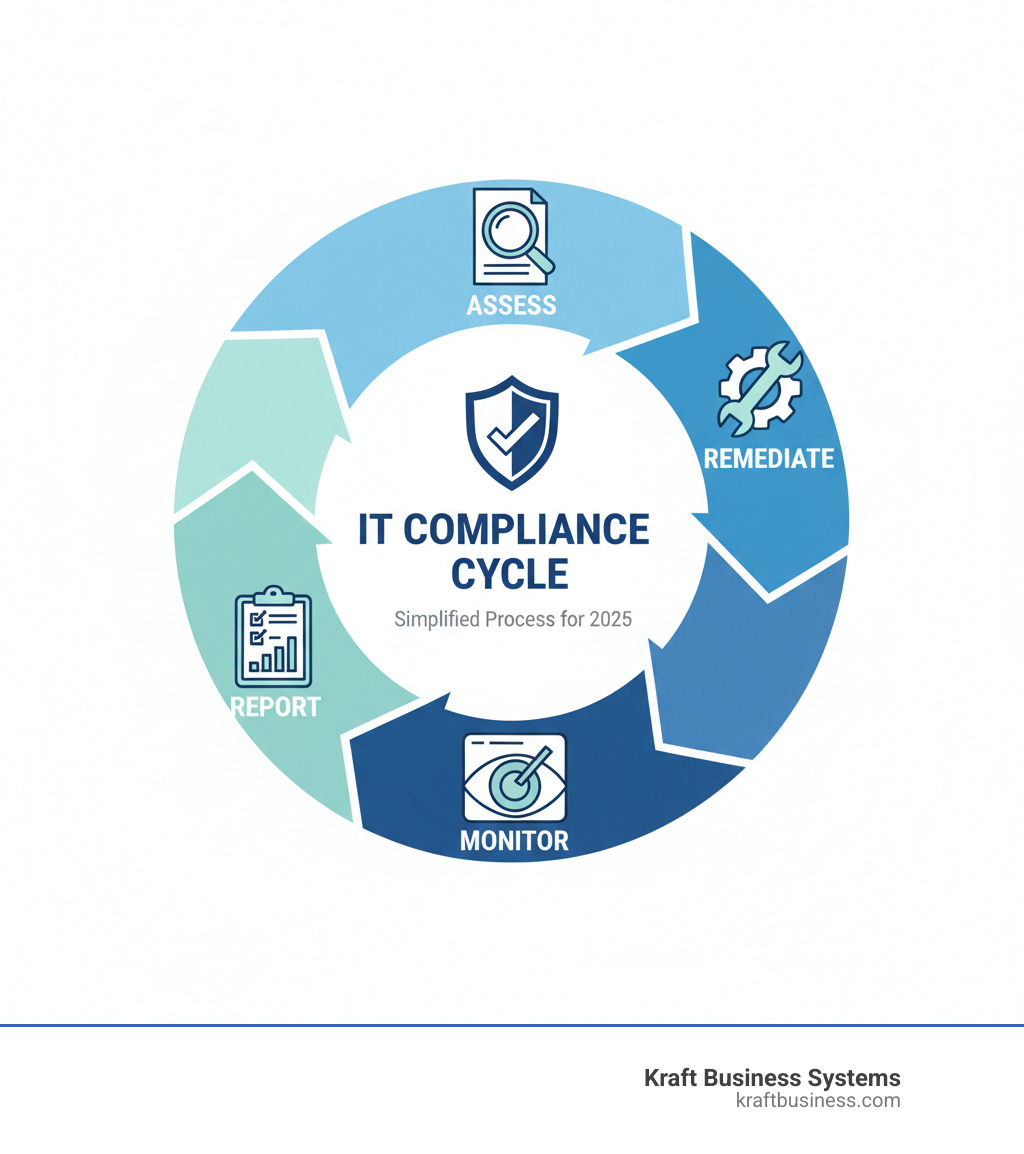AI Overview:
IT compliance services ensure that your business technology systems meet regulatory, legal, and industry standards such as HIPAA, PCI DSS, GDPR, SOC 2, NIST, and CMMC. These services safeguard sensitive data, prevent costly penalties, and strengthen overall cybersecurity posture. Think of them as your digital rulebook—helping your organization stay secure, trustworthy, and competitive in today’s connected world.
Why IT Compliance Services Are Essential for Modern Businesses
IT compliance services help businesses meet regulatory requirements, protect sensitive data, and avoid costly penalties through expert guidance and specialized tools. These services ensure your technology infrastructure adheres to industry standards like HIPAA, PCI DSS, GDPR, and SOC 2.
What IT compliance services include:
- Risk assessments – Identify vulnerabilities in your current systems
- Gap analysis – Compare your setup against required standards
- Implementation support – Help you fix identified issues
- Ongoing monitoring – Continuous oversight to maintain compliance
- Audit preparation – Get ready for official reviews
- Documentation – Create required policies and procedures
Compliance isn’t optional. It’s a business necessity that protects your company from data breaches, legal troubles, and damaged reputation.
The stakes are high. IBM’s Cost of a Data Breach Report shows that the average cost of a data breach is significant enough to threaten business survival. Beyond financial losses, non-compliance can result in:
- Heavy fines from regulatory bodies
- Lost customer trust and damaged reputation
- Legal lawsuits and ongoing litigation costs
- Operational shutdowns while fixing violations
Many mid-sized businesses struggle with compliance because regulations are complex and constantly changing. You need specialized knowledge to steer frameworks like NIST, understand what data needs protection, and implement the right security controls.
That’s where IT compliance services become invaluable. They bring the expertise you need without requiring you to become a compliance expert yourself.
Quick it compliance services terms:
- IT compliance and governance
- IT compliance audit services
- IT compliance and risk management
What is IT Compliance and Why Is It a Business Imperative?
IT compliance is fundamentally about making sure your business’s technology systems follow specific rules, regulations, and standards. Think of it as your digital rulebook – one that’s designed to keep your company and your customers’ information safe.
These standards aren’t suggestions. They’re requirements set by government agencies, industry bodies, and regulatory organizations who understand that in our connected world, data protection isn’t optional. When we talk about IT compliance, we’re really talking about three critical pillars: data integrity (keeping information accurate and complete), confidentiality (ensuring only authorized people can access it), and availability (making sure systems work when you need them).
Here’s the reality: IT compliance isn’t just about avoiding trouble – it’s about building a foundation for business success. Companies that accept compliance find themselves better positioned to win new clients, enter new markets, and sleep better at night knowing their systems are secure.
But let’s be honest about what happens when businesses try to skip this step.
The High Cost of Non-Compliance
The consequences of ignoring IT compliance requirements can be absolutely devastating. We’re not talking about a slap on the wrist here – we’re talking about business-ending scenarios that happen more often than you might think.
Financial penalties hit first and hit hard. Regulatory bodies don’t mess around when it comes to violations. Depending on which standards you’ve violated and how many people are affected, fines can range from thousands to millions of dollars. The exact amount depends on factors like how long the violation lasted and whether this is a repeat offense.
Legal battles often follow close behind. When customer data gets compromised because of compliance failures, class-action lawsuits are almost inevitable. Between legal fees, settlements, and court costs, these battles can drain resources faster than most businesses can handle. According to IBM’s research on data breach costs, the financial impact extends far beyond the initial incident.
Lost customers and revenue create the most lasting damage. News of a compliance failure or data breach travels fast, and customer confidence disappears even faster. When people lose trust in your ability to protect their information, they take their business elsewhere – and they tell their friends to do the same.
Operational downtime compounds every other problem. Investigating violations, fixing security gaps, and rebuilding systems can bring your entire operation to a halt. Systems go offline, productivity plummets, and the costs keep mounting while you’re scrambling to get back on track.
The most painful part? Damaged reputation can take years to rebuild, if it’s even possible. Once customers, partners, and investors lose faith in your company’s ability to handle data responsibly, earning that trust back becomes an uphill battle that affects everything from employee morale to future business opportunities. This is where business data recovery services become critical – not just for recovering data, but for recovering your business’s reputation and stability.
The Core Goal: Protecting Sensitive Data
Every IT compliance framework exists for one primary reason: protecting the sensitive information that keeps businesses and individuals safe. This isn’t abstract concept – we’re talking about real data that, if it falls into the wrong hands, can cause serious harm.
Customer data includes everything from basic contact information and addresses to detailed purchasing histories and online behavior patterns. Employee information covers personal details, payroll records, health information, and performance reviews that workers trust you to keep private.
Then there’s your intellectual property – the trade secrets, patents, proprietary designs, and research data that give your company its competitive edge. And of course, financial records like bank account numbers, credit card details, and transaction histories that criminals would love to get their hands on.
Effective IT compliance services ensure this data stays protected throughout its entire lifecycle. From the moment information enters your systems until it’s properly disposed of, compliance frameworks provide the roadmap for keeping it secure. This requires a solid data governance strategy that connects your compliance policies directly to how your team handles information day-to-day.
Smart businesses also recognize that protection includes preparation for the worst-case scenario. That’s why robust data backup and recovery services are essential components of any compliance strategy. Even if something goes wrong, you can restore operations quickly and securely.
For more insight into building a comprehensive approach, check out our guides on IT compliance and risk management and cybersecurity compliance. These resources can help you understand how all the pieces fit together to create a security strategy that actually works.
A Guide to Common IT Compliance Frameworks and Standards
Think of IT compliance frameworks as different languages that various industries speak to protect sensitive information. Each framework has its own vocabulary, rules, and requirements – but they all share the same goal of keeping data safe and secure.
Understanding which frameworks apply to your business is like knowing which road signs to follow on your compliance journey. Some are industry-specific mandates created by regulatory bodies, while others are government requirements that cast a wider net. The key is identifying which ones matter for your particular situation.
Let’s walk through the major players in the compliance world and what they mean for your business.
Healthcare: HIPAA
If you handle any type of health information, HIPAA is your North Star. The Health Insurance Portability and Accountability Act doesn’t just apply to hospitals and doctor’s offices – it covers anyone who touches protected health information, including business associates like IT service providers.
HIPAA’s main concern is Protected Health Information (ePHI) – basically any health data that can be tied to a specific person. This means healthcare providers need to treat this information like digital gold, with layers of security protecting it at every turn.
The framework requires encryption of all health data, whether it’s sitting in storage or traveling across networks. You’ll also need regular HIPAA risk assessments to spot potential vulnerabilities before they become problems.
Access controls are another cornerstone – only the people who absolutely need to see patient information should have access to it. Plus, you need to keep detailed audit trails showing who accessed what data and when. It’s like having a security camera for your digital files.
For medical practices, specialized IT support for healthcare ensures every piece of technology meets these strict standards while keeping operations running smoothly.
Finance and E-commerce: PCI DSS
Anyone who processes, stores, or transmits credit card information needs to know about PCI DSS – the Payment Card Industry Data Security Standard. Whether you’re a small online shop or a large financial institution, this framework applies to you.
PCI DSS is built around the idea of protecting cardholder data throughout its entire lifecycle. The framework requires businesses to maintain secure networks with properly configured firewalls and never store sensitive authentication data after authorization.
Encrypting sensitive data is non-negotiable, and the standard emphasizes that you should never store cardholder data unless absolutely necessary. When you do need to keep it, it must be protected with military-grade security measures.
Regular testing is another crucial requirement – quarterly vulnerability scans and annual penetration tests help identify weak spots before criminals do. The framework also demands robust security policies that are regularly updated and enforced across the organization.
For businesses handling financial transactions, IT support for financial services provides the specialized expertise needed to maintain PCI DSS compliance while processing payments securely.
Data Privacy: GDPR & CCPA
Data privacy regulations have transformed how businesses handle personal information, giving individuals more control over their digital footprints.
GDPR (General Data Protection Regulation) applies to any organization worldwide that collects or processes personal data of EU citizens. It doesn’t matter where your business is located – if you have European customers, GDPR likely applies to you.
The regulation emphasizes consent management – people need to explicitly agree to how their data is used, and they can withdraw that consent at any time. GDPR also grants individuals powerful rights, including the ability to access their data, correct inaccuracies, and even request complete deletion.
CCPA (California Consumer Privacy Act) brings similar protections to California residents. It gives consumers the right to know what personal information is collected about them, the right to delete that information, and the right to opt-out of its sale.
Both regulations require businesses to understand their data processing rules thoroughly and maintain clear documentation of how personal information flows through their systems.
Service Organizations: SOC 2
SOC 2 is designed for service organizations that store customer data in the cloud. Unlike other compliance frameworks that provide strict checklists, SOC 2 is more like a report card that evaluates your controls across five key areas.
The Trust Services Criteria form the backbone of SOC 2 evaluation. Security ensures protection against unauthorized access, while availability guarantees systems are operational when needed. Processing integrity confirms that data processing is complete and accurate, confidentiality protects designated sensitive information, and privacy safeguards personal information according to your stated principles.
Achieving SOC 2 compliance is powerful for building client trust. When you can show potential customers an independent auditor’s report confirming your security controls, it speaks volumes about your commitment to protecting their data.
Government & Defense: NIST & CMMC
Organizations working with the federal government or Department of Defense face specialized compliance requirements designed to protect national security interests.
The NIST Cybersecurity Framework provides a flexible approach to managing cybersecurity risks across all types of organizations. It’s built around five core functions: identify, protect, detect, respond, and recover. This framework helps organizations understand their current security posture and develop strategies for improvement.
CMMC (Cybersecurity Maturity Model Certification) takes things further for DoD contractors. It introduces cybersecurity maturity levels ranging from basic to advanced, with contractors needing to achieve specific levels to bid on defense contracts.
CMMC isn’t just about technology – it often requires organizational changes to meet the required compliance level. The certification process is rigorous, but it opens doors to lucrative government contracts while strengthening overall cybersecurity defenses.
For Michigan businesses engaging with government entities, understanding cybersecurity compliance for Michigan requirements is essential for navigating these complex frameworks successfully.
[TABLE] Comparing Key IT Compliance Frameworks
Here’s a clear comparison of the major IT compliance services frameworks and what they protect:
| Framework | Primary Industry | Data Protected | Main Goal |
|---|---|---|---|
| HIPAA | Healthcare, Business Associates | Protected Health Information (PHI/ePHI) | Ensure privacy and security of patient data |
| PCI DSS | Any entity processing credit cards | Cardholder Data | Secure credit card transactions and data |
| GDPR | Any entity processing EU citizen data | Personal Data of EU citizens | Protect fundamental right to privacy and personal data |
| CCPA | Any entity processing CA resident data | Personal Data of CA residents | Grant CA consumers rights over their personal data |
| SOC 2 | Service organizations | Customer data hosted by service organization | Assure clients of data security, availability, integrity, confidentiality, privacy |
| NIST CSF | All industries, Government | All sensitive data, critical infrastructure | Manage and reduce cybersecurity risk |
| CMMC | DoD Contractors | Federal Contract Information (FCI), Controlled Unclassified Information (CUI) | Improve cybersecurity posture of the defense industrial base |
Understanding which frameworks apply to your business is the first step toward building a comprehensive compliance strategy that protects your data and opens new opportunities.
The Key Benefits and Offerings of IT Compliance Services
When your business is juggling daily operations, customer demands, and growth challenges, IT compliance services can feel like a lifesaver. Think of it this way: instead of trying to become an expert in every regulation while running your business, you get access to specialists who live and breathe compliance every day.
The numbers tell a compelling story. Harvard Business Review found that outsourcing IT management can reduce operational expenses by up to 30%. That’s not just about saving money – it’s about redirecting your energy toward what you do best. Gartner predicts that by 2025, 70% of businesses will outsource at least one critical IT function to improve agility and reduce costs.
For businesses in Grand Rapids and across Michigan, this trend makes perfect sense. Why struggle with the complexities of HIPAA or PCI DSS when you can partner with experts who handle these frameworks daily? Our managed IT services for small businesses include exactly this type of vital compliance support.
What are the key benefits of engaging IT compliance services?
The real magic happens when IT compliance services transform from a necessary expense into a strategic advantage. We’ve seen businesses completely change their trajectory once they stop worrying about compliance and start focusing on growth.
Risk reduction becomes your first line of defense. Instead of crossing your fingers and hoping nothing goes wrong, you get proactive identification and mitigation of vulnerabilities. This dramatically lowers your chances of experiencing data breaches, legal headaches, or reputation damage.
Your security posture improves almost immediately. Compliance experts don’t just check boxes – they implement best practices and robust security controls that create a stronger overall defense against cyber threats. It’s like upgrading from a basic lock to a sophisticated security system.
Operational efficiency often surprises our clients the most. When experts streamline your processes and automate routine compliance tasks, your internal team suddenly has time to focus on innovation and strategic projects. The technology overlaps between different frameworks mean you’re not duplicating efforts.
Scalability ensures your compliance grows with your business. As you expand into new markets or add new services, your compliance framework adapts seamlessly. You won’t hit those painful growth walls where regulatory requirements suddenly become overwhelming.
Perhaps most importantly, you get peace of mind. Knowing that compliance experts are managing your regulatory obligations lets you sleep better at night. This mental freedom is invaluable for business owners who already carry so much responsibility. It’s a cornerstone of effective IT compliance and governance.
How do IT compliance services help organizations manage risks?
Risk management isn’t about paranoia – it’s about smart business planning. IT compliance services provide a structured, methodical approach to identifying and addressing potential threats before they become expensive problems.
Proactive vulnerability identification starts with comprehensive IT security risk assessments that go far beyond simple checklists. Experts examine your systems, networks, and processes with fresh eyes, spotting weaknesses that internal teams might miss due to familiarity or resource constraints.
Policy enforcement and development creates the framework your team needs to succeed. Clear, actionable security policies ensure everyone understands their role in maintaining compliance. These aren’t dusty documents sitting in a drawer – they’re living guidelines that actually get used.
Continuous monitoring means compliance becomes an ongoing strength rather than an annual headache. Real-time detection of suspicious activities, configuration changes, and potential violations keeps you ahead of problems. This “always-on compliance monitoring” approach reduces audit stress and ensures you’re ready for regulatory reviews at any time.
When things do go wrong, incident response planning makes all the difference. Having a clear, tested plan for security incidents minimizes damage and speeds recovery. This planning integrates seamlessly with disaster recovery planning to ensure your business can weather any storm.
Core Solutions Offered by Providers
IT compliance services providers offer a comprehensive toolkit designed to meet businesses wherever they are in their compliance journey. The beauty lies in how these solutions work together to create a complete compliance ecosystem.
IT Compliance Assessments & Audits serve as your starting point and ongoing checkup system. These evaluations examine your current IT infrastructure against specific regulatory requirements, identify gaps, assess risks, and provide a clear roadmap for achieving compliance. They also prepare you for formal audits, turning what could be a stressful experience into a confident demonstration of your compliance posture.
IT Compliance Consulting Services bring expert guidance directly to your strategic planning. Complex regulations become manageable when you have specialists helping you understand requirements and develop customized compliance programs. Our IT compliance consulting services focus on making the complex simple and the overwhelming achievable.
Managed Compliance & Security provides the ongoing support that keeps compliance from becoming a burden. Continuous monitoring, evidence collection, and policy enforcement happen behind the scenes, managed by experts who actively tune your compliance program. This approach often integrates with managed cybersecurity services for comprehensive protection.
Strategy & Policy Development creates the foundation everything else builds upon. Custom compliance programs align with your specific business goals and regulatory requirements. These aren’t generic templates – they’re carefully crafted frameworks that fit your organization’s unique needs and culture.
Remediation & Implementation turns assessments into action. Once gaps are identified, experts help implement necessary controls, update systems, and fix vulnerabilities. This hands-on support ensures you don’t just know what needs to be done – you actually get it done correctly and efficiently.
How to Choose the Right Provider and Leverage Technology
Finding the perfect IT compliance services partner feels a bit like dating – you want someone who truly “gets” your business, shares your values, and will stick with you through thick and thin. The stakes are high because this relationship directly impacts your security, efficiency, and reputation.
The landscape has evolved dramatically. Modern compliance isn’t about shuffling paperwork and checking boxes anymore. It’s about leveraging smart technology, automation, and GRC (Governance, Risk, and Compliance) solutions that work behind the scenes to keep you protected and compliant.
Key Criteria for Selecting a Compliance Partner
When you’re evaluating potential partners, think beyond the glossy brochures and sales pitches. What really matters is finding someone who understands your world.
Industry experience should be your starting point. A provider who’s worked extensively in healthcare will speak HIPAA fluently, while someone with deep financial services experience knows PCI DSS inside and out. If you’re a law firm, you’ll want a partner experienced in IT support for law firms who understands attorney-client privilege and confidentiality requirements.
Framework expertise goes hand-in-hand with industry knowledge. Don’t just take their word for it – ask about their certifications, recent audit successes, and how they stay current with changing regulations. The best providers eat, sleep, and breathe these frameworks.
The technology stack they use reveals a lot about their sophistication. Modern compliance requires modern tools. Look for providers who leverage advanced GRC software, automated evidence collection, and continuous monitoring capabilities. If they’re still managing compliance with spreadsheets and manual processes, that’s a red flag.
Client testimonials tell the real story. Ask for references from businesses similar to yours. How do their existing clients feel about the partnership? What challenges did they help solve? A provider confident in their work will happily connect you with satisfied customers.
Scalability matters more than you might think initially. Your compliance needs will evolve as you grow, enter new markets, or face new regulations. Choose a partner who can adapt and grow with you rather than forcing you to switch providers down the road.
For Michigan businesses, local support can be invaluable. Having a provider with offices in Grand Rapids, Detroit, and Lansing means they understand local business culture and can provide on-site support when needed. Sometimes, face-to-face conversations make all the difference.
The Role of Technology and Automation in Modern Compliance
Technology has transformed compliance from a painful, manual process into something much more manageable and effective. The days of drowning in paperwork and scrambling to gather evidence for audits are rapidly becoming history.
GRC software serves as the central nervous system of modern compliance operations. These GRC compliance tools create a unified platform where you can track controls, manage documentation, and monitor your compliance posture in real-time. Think of it as your compliance command center.
Automated evidence collection is perhaps the biggest game-changer we’ve seen. Instead of spending weeks gathering screenshots, logs, and documentation for auditors, automated systems can collect this evidence continuously. Some solutions deliver 90% faster evidence collection, which means your team can focus on strategic work rather than audit prep.
Continuous monitoring tools provide something that was impossible in the old days – real-time visibility into your compliance status. These systems watch for configuration changes, policy violations, and security threats around the clock. You’ll know about potential issues immediately, not months later during an audit.
Vulnerability scanning and automated patch management have become essential components. Platforms like ManageEngine’s UEM platform deliver automated, scalable patch workflows that keep your systems secure against known vulnerabilities without requiring constant manual intervention.
AI is starting to revolutionize how we approach compliance. From analyzing vast amounts of data to identifying anomalies and validating controls, artificial intelligence is making compliance smarter and more efficient. However, we believe in balance – AI for efficiency, people for accuracy. Technology should improve human expertise, not replace it.
The best IT compliance services providers understand that technology isn’t just a nice-to-have anymore – it’s essential for managing the complexity and scale of modern compliance requirements. When evaluating providers, pay close attention to how they leverage these technologies to make your life easier and your business more secure.
Turning Compliance into a Competitive Advantage
While IT compliance services might initially seem like a necessary evil or a regulatory burden, we firmly believe that they can be transformed into a powerful competitive advantage. It’s about moving beyond simply “checking a box” and instead viewing compliance as a strategic business asset that drives growth and builds enduring trust.
Think of it this way: when you invest in strong compliance practices, you’re not just avoiding problems – you’re building something valuable that sets you apart from the competition. Companies that accept compliance as a core business principle can differentiate themselves, attract new customers, and ultimately improve their market position. As one expert insight suggests, compliance can be positioned as a “secret growth weapon,” allowing businesses to “open up new markets or revenue streams.”
The shift in mindset is crucial. Instead of seeing compliance as a cost center, successful businesses recognize it as an investment in their future. When done right, compliance becomes part of your company’s DNA, influencing everything from how you design systems to how you train employees.
Building Customer Trust and Enhancing Reputation
In today’s digital landscape, trust is perhaps a business’s most valuable currency. Strong IT compliance services and practices directly contribute to building and maintaining that trust in ways that translate to real business value.
Demonstrating security commitment is one of the most powerful ways compliance builds trust. When you adhere to stringent compliance frameworks like SOC 2 or HIPAA, you’re making a visible statement about your commitment to protecting sensitive data. This reassures customers, partners, and stakeholders that their information is genuinely safe with you – not just because you say so, but because independent auditors have verified it.
Transparency becomes much easier when you have solid compliance practices in place. For example, HITRUST CSF helps create transparency between business partners and consumers due to its certifiability, which increases trust. When potential customers ask about your security practices, you can point to specific certifications and frameworks rather than giving vague assurances.
Your compliance efforts also serve as a powerful shield for protecting your brand image. Proactive compliance prevents costly data breaches and regulatory fines, safeguarding your reputation from the negative publicity that accompanies security incidents. It’s much easier to build a brand than to rebuild one after a major security failure.
Perhaps most importantly, many customers today are security-conscious and actively seek out partners who prioritize compliance. Your adherence to standards like SOC 2 or HIPAA can become a key selling point, leading to increased customer loyalty and even premium pricing opportunities.
Gaining a Competitive Edge
Beyond trust, a robust compliance program offers distinct competitive advantages that can directly impact your bottom line and market position.
Compliance can literally open up new markets for your business. Certain industries or geographies require specific certifications – think CMMC for DoD contracts or GDPR compliance for EU markets. Achieving these certifications doesn’t just check a box; it open ups access to entirely new customer segments and revenue streams that were previously off-limits.
When it comes to winning contracts, compliance often becomes the deciding factor. Many government contracts and partnerships with larger enterprises mandate specific compliance certifications. Being compliant positions you as a preferred vendor and helps you “secure government contracts” while competitors without proper certifications are automatically disqualified.
In crowded markets, compliance serves as a powerful differentiator. While your competitors might struggle to meet baseline requirements, your proactive approach showcases reliability and expertise. We believe that “meeting compliance requirements is a must-have” for any business aiming to stay ahead, but exceeding them is what creates real competitive advantage.
Your compliance certifications aren’t just internal documents – they’re powerful testimonials that you can leverage as sales tools. These certifications provide third-party validation of your security posture, significantly boosting your credibility during sales conversations. This approach is especially effective for small business technology services looking to compete with larger firms by demonstrating equal or superior security standards.
Frequently Asked Questions about IT Compliance Services
When businesses start exploring IT compliance services, they naturally have questions about cost, timing, and whether they can handle compliance on their own. These are smart questions to ask – compliance is a significant investment, and you want to make sure you’re making the right decisions for your business.
How much do IT compliance services cost?
The honest answer is that IT compliance services costs vary quite a bit, and there's a good reason for that. Think of it like asking "how much does a car cost?" – it depends on what you need.
Several factors influence pricing: your business size affects the scope of work needed, the complexity of your IT environment determines how much effort is required, the specific frameworks you need to meet (HIPAA, PCI DSS, SOC 2, etc.) each have different requirements, and your current security posture impacts how much work needs to be done to get you compliant.
Services typically fall into two categories: one-time assessments help you understand where you stand and what needs fixing, while ongoing managed subscriptions provide continuous monitoring and support to keep you compliant over time.
Here's what we always tell our clients: compliance isn't just a cost – it's an investment that pays dividends in risk mitigation and customer trust. The peace of mind alone is often worth it, not to mention avoiding potentially devastating fines and breaches.
How long does it take to become compliant?
This is probably the second-most common question we hear, and like costs, the timeline really depends on your specific situation.
The framework you're targeting makes a big difference – some standards are more straightforward than others. The scope of your environment matters too – a small office with basic systems will move faster than a complex multi-location setup. Most importantly, the gaps identified during your initial assessment determine how much work lies ahead.
In our experience, timelines can range anywhere from a few weeks for small, focused projects to over a year for complex certifications like SOC 2 or CMMC. Don't let the longer timelines scare you though – much of that time is spent on documentation and process improvements that benefit your business in many ways.
The good news is that a thorough initial assessment can provide a much clearer estimate. We always start there because it gives everyone realistic expectations about the journey ahead.
Can a small business handle IT compliance without help?
Technically? Yes, it's possible. Practically? It's extremely challenging, and here's why.
Compliance requires specialized expertise that most businesses don't have in-house. The regulations are complex, constantly changing, and filled with technical jargon that can be confusing even for IT professionals. You also need significant time and resources – someone has to research requirements, implement controls, document everything, and stay current with changes.
For most small businesses, trying to handle compliance internally means pulling key people away from their core responsibilities. Your IT person becomes a compliance expert instead of focusing on keeping your systems running smoothly. Your office manager starts drowning in policy documentation instead of managing daily operations.
That's where engaging IT compliance services makes real sense. You get access to specialized knowledge and tools at a fraction of what it would cost to build that expertise internally. More importantly, you can focus on what you do best – running your business – while experts handle the compliance complexities.
We've seen too many small businesses struggle with DIY compliance, often ending up more frustrated and less secure than when they started. Professional guidance ensures you can compete effectively and securely without the headaches of trying to become a compliance expert overnight.
Conclusion
We’ve journeyed through the intricate world of IT compliance together, uncovering everything from its fundamental definition to the severe consequences that await businesses who ignore it. We’ve explored the diverse frameworks that govern data protection across industries – from HIPAA in healthcare to PCI DSS in finance – and finded how engaging IT compliance services offers far more than just penalty avoidance.
The benefits we’ve discussed are tangible and transformative. IT compliance services don’t just mitigate risks; they drive operational efficiency, build unshakeable customer trust, and ultimately give you a competitive edge that sets you apart in the marketplace.
Here’s what we want you to remember: compliance isn’t a destination with a finish line. It’s an ongoing journey where regulations constantly evolve, technologies shift, and cyber threats adapt with alarming creativity. Think of it like maintaining your health – you can’t exercise once and expect to stay fit forever.
That’s why a proactive approach, backed by expert guidance and modern tools, isn’t just recommended – it’s essential for survival and growth in today’s digital landscape.
At Kraft Business Systems, we’ve planted our roots firmly in Michigan soil, with offices spanning Grand Rapids, Detroit, Lansing, and across the state. We understand the unique challenges that Michigan businesses face because we live and work alongside you. Our diverse team of consultants and industry experts isn’t just technically skilled – we’re dedicated partners who genuinely care about helping you steer the complex world of IT compliance.
We believe in providing innovative and secure technology solutions that let you operate with complete confidence. When you’re not worried about compliance gaps or security vulnerabilities, you can focus on what you do best – growing your business and serving your customers.
Compliance is a critical investment in your company’s security, trust, and future growth. It’s not an expense; it’s protection for everything you’ve worked to build.
Ready to transform your compliance from a burden into a business advantage? Let’s work together to secure your future. Secure your business with expert IT solutions from Kraft Business Systems today.











